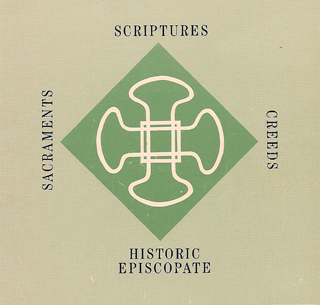On July 26 the Episcopal Church commemorates William Reed Huntington. He was born in Lowell, Massachusetts, in 1838, studied at Harvard, and was ordained a priest in 1862.
 There are many reasons Huntington was included in the church calendar. In 1871 he moved for the restoration of the ancient Order of Deaconesses, which was finally officially authorized in 1889. Huntington was one of the chief supporters of revising the Book of Common Prayer (the revision was completed in 1892). Some of the prayers he wrote for that revised version are still in use.
There are many reasons Huntington was included in the church calendar. In 1871 he moved for the restoration of the ancient Order of Deaconesses, which was finally officially authorized in 1889. Huntington was one of the chief supporters of revising the Book of Common Prayer (the revision was completed in 1892). Some of the prayers he wrote for that revised version are still in use.
In his book “The Church Idea” (1870), Huntington undertook to discuss the basis of Christian unity, and he formulated the Chicago-Lambeth Quadrilateral, a statement adopted first by the House of Bishops of the Episcopal Church in 1886 and then, with slight modifications, by the Bishops of the world-wide Anglican Communion assembled at Lambeth in 1888. These are four principles that, from the Anglican point of view, create a basis for restoring the church’s unity. Before we cite the Quadrilateral, we would like to remind some fragments of the preface to that document, adopted by the House of Bishops.
We, Bishops of the Protestant Episcopal Church in the United States of America, in Council assembled as Bishops of the Church of God, do hereby solemnly declare to all whom it may concern, and especially to our fellow Christians of the different Communions in this land, who, in their several spheres, have contended for the religion of Christ:
(1) Our earnest desire that the Saviour’s prayer: “That we all may be one,” may, in its deepest and truest sense, be speedily fulfilled;
(2) That we believe that all who have been duly baptized with water, in the name of the Father, and of the Son, and of the Holy Ghost, are members of the Holy Catholic Church;
(3) That in all things of human ordering or human choice, relating to modes of worship and discipline, or to traditional customs, this Church is ready in the spirit of love and humility to forego all preferences of her own;
(4) That this Church does not seek to absorb other Communions, but rather, co-operating with them on the basis of a common Faith and Order, to discountenance schism, to heal the wounds of the Body of Christ, and to promote the charity which is the chief of Christian graces and the visible manifestation of Christ to the world;
But furthermore, we do hereby affirm that the Christian unity… can be restored only by the return of all Christian communions to the principles of unity exemplified by the undivided Catholic Church during the first ages of its existence; which principles we believe to be the substantial deposit of Christian Faith and Order committed by Christ and his Apostles to the Church unto the end of the world …
And here follows the Lambeth version of the Quadrilateral itself:
(a) The Holy Scriptures of the Old and New Testaments, as “Containing all things necessary to salvation,” and as being the rule and ultimate standard of faith.
(b) The Apostles’ Creed, as the Baptismal Symbol; and the Nicene Creed, as the sufficient statement of the Christian Faith.
(c) The two Sacraments ordained by Christ Himself — Baptism and the Supper of the Lord — ministered with unfailing use of Christ’s words of Institution, and of the elements ordained by Him.
(d) The Historic Episcopate, locally adapted in the methods of its administration to the varying needs of the nations and peoples called of God into the Unity of the Church.
We posted both the Quadrilateral and the preface to it today not only in order to commemorate the Rev. William Reed Huntington. We think that, when some church communities show their true colours again, preaching that they and only they are the true churches of Jesus Christ here on earth, shamelessly engaging in proselytism towards churches with which they simultaneously engage in dialog, in times that are marked with documents like “Anglicanorum Coetibus”, we not only can, but should remind of such declarations like the Chicago-Lambeth Quadrilateral, which signify a different approach to ecumenism.





Pingback: Thoughts on Apostolic Succession | Don't Shoot the Prophet